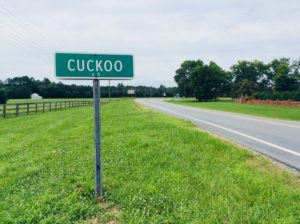 It was late afternoon earlier this week, day eight of my road trip from the tip of Florida up the East Coast to Vermont. It was time for coffee to fuel the next 200 miles I needed to bank to reach my final destination. I pulled off Interstate 88 in verdant, undulating eastern New York. Two women sitting on a stoop directed me to the town’s only coffee shop. Inside were three tables, a duet of overstuffed couches, a chalkboard listing fancy coffees and a lanky barista. As I made my way to the back counter to order, two women in hiking gear seated at a table stopped their conversation. “Who are you?” one asked as she looked at me, smiling.
It was late afternoon earlier this week, day eight of my road trip from the tip of Florida up the East Coast to Vermont. It was time for coffee to fuel the next 200 miles I needed to bank to reach my final destination. I pulled off Interstate 88 in verdant, undulating eastern New York. Two women sitting on a stoop directed me to the town’s only coffee shop. Inside were three tables, a duet of overstuffed couches, a chalkboard listing fancy coffees and a lanky barista. As I made my way to the back counter to order, two women in hiking gear seated at a table stopped their conversation. “Who are you?” one asked as she looked at me, smiling.
I was startled and must have looked it. “I don’t mean anything by that,” she said. “I was just curious. I haven’t seen you around here.”
The two women looked at me expectantly. The young man sitting solo at the table beside them looked, the barista looked. I said the first thing that popped into my head: “I am a traveler just passing through.”
That must have been the magic password. The barista slipped me a free scone. The women had more questions. The solo man put down his phone and joined our conversation. I drank my coffee and we all chitchatted about traveling, road trips and being far from home. As I left, one of them said: “Have a good trip. There’s a lot of America out there.”
There is a lot of America out here, and I have yearned to be in it, to move through it, to see it and smell it. For the past three summers, I have road tripped and transected the USA, crossing from Flagstaff to Florida, up the east coast to New England and in the next few weeks, back to Flag across this nation’s midsection. I’ve motored on the 48,000-mile latticework of interstates championed by President Dwight D. Eisenhower, a military man who was in office when I was born. Ike is reputed to have said: Plans are nothing; planning is everything, which sounds like a mashup of a Zen koan and self-help book title.
While the interstate system has ferried me from here to there with speed and the raisin toast I find on Waffle House menus, I’ve preferred low roads, the curly, two-lane byways that snake through towns like Henry, Louisiana; Watha, North Carolina; and Bigfoot, Texas. There is a lot of America out here and I’ve been looking at it for however many hours makes up 13,000 miles. Here’s a dispatch from the East Coast:
—The weather forecast is simple. Green and humid. Clouds. Occasional fireflies, partly mosquitos.
—The water is high. From Miami Beach to the Low County of South Carolina and up to the marshy inland coastal towns of North Carolina I saw water rising and spilling and collecting. Harbor water, inlet water, canal water—levels at the tippy top, lapping over the docks and pilings and concrete barriers. Water pooling in city streets long after rainfall, unable to absorb into oversaturated lowlands. In the Southwest, we wrestle with the dearth of water. On the East Coast, the struggle is with excess.
—The highways are widening. Jacksonville, Savannah, Charlotte, Raleigh, Harrisburg, Scranton. Construction crews, orange traffic cones, cranes, one-lane traffic, men in green safety vests. The East Coast is in an interstate widening expansion frenzy, attempting to alleviate daily traffic congestion and to improve evacuation routes for emergencies.
—NPR can cause paralysis. Car time means radio time. Radio time means NPR. NPR means earnest, insightful programming, news and analysis. News and analysis means relaying the antics of President Trump. New York Times reporter Michelle Goldberg put it this way in an opinion piece last week: “The president cages children, dehumanizes immigrants, spurns other democracies, guts health care protections, uses his office to enrich himself and turns public life into a deranged phantasmagoria with his incontinent flood of lies.” A few hours of Joshua Johnson, Marie Louise Kelly and Terry Gross dissecting that incontinent flood leaves my brain barbecued.
As I watch the country blur by and listen to reports of its demise, I see also the humor, the pluck, the kindness. I despair over the decay of discourse, the erosion of democracy, the vilification of the media. But like Walt Whitman, I also hear America singing. I try to find that frequency as I wend along. I hum and lift my voice to something higher. And then I pull over, fill my tank and motor on.

